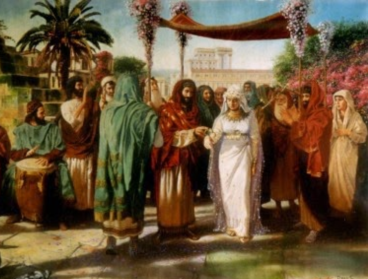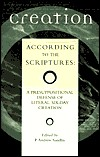PSALM 45 AND THE MESSIAH
PMW 2023-087 by Kenneth L. Gentry, Jr.
Psalm 45:1–7 is a royal wedding hymn psalm. It engages in praise that is so exalted that it is primarily Messianic in function. However, it could apply to an earthly king in an ideal sense as the goal at which his rule should aim. Yet its Messianic purpose is the ancient view among both Jewish and Christian interpreters. We even see its Messianic function in the New Testament (Heb. 1:8–9). In this regard, notice the following.
The title of this Psalm is the longest by far in all the Psalms: “For the choir director; according to the Shoshannim. A Maskil of the sons of Korah. A Song of Love.” This emphasizes its deep and solemn significance in presenting the glorious wedding hymn — for the Messiah.
“Shoshannim” means “lilies,” a beautiful flower that was used in the temple (cp. 1 Kgs. 7:19, 22, 26). As a plural it seems to refer to the beauty of the corporate bride, the people of God. Thus, we see several female figures in the psalm (vv. 9, 10, 15). That it is a “song of love” comports with its wedding function, showing his love for the bride. This theme is taken up also in the Song of Solomon.
 Creation according to the Scriptures
Creation according to the Scriptures
Ed. by P. Andrew Sandlin
This book is sub-titled: A Presuppositional Defense of Literal , Six-day Creation. It has chapters by R. J. Rushdoony, Andrew Sandlin, Kenneth Gentry, Cornelius Van Til, and others. It touches on historical, exegetical, theological, and philosophical implications of Six-day Creation.
See more study materials at: www.KennethGentry.com
It is further noted that the psalm was a “Maskil.” This is a technical term signifying its instructional purpose. This pedagogic function suggests its pointing to something of great significance (i.e., the Messiah) rather than simply being a joyful wedding song.
This hymn offers such high praise of the King, that it must point beyond any earthly king to someone greater. Any earthly king would be but a type of the Messianic King (for “type” my previous article). It declares this King is full of beauty and grace (v. 2; cp. John 1:14) and is a righteous conqueror for the cause of truth (vv. 4–5). This fits well with the New Testament revelation of the “marriage supper of the Lamb,” who goes forth to conquer as one who is “True” (Rev. 19:9–11). The marriage of God to his people is frequently noted in Scripture (Isa. 44:5; 62:4–5; Jer. 3:1; Eze. 16; 23; Matt. 9:15; 22:2; 25:1; John 3:29; Rom. 7:4; 2 Cor. 11:2; Eph. 5:25–32; Rev. 19:7; 21:2; 22:17). See especially Hosea 1–3.
The King is expressly addressed as divine: “Your throne, O God.” And his rule is emphatically declared to be “forever and ever” (v. 6; cp. Luke 1:32–33). He will be praised “forever and ever” by all peoples (v. 17). That is, all nations shall come to him and praise his name forever (Psa. 22:27; 86:9; Isa. 2:2–4).
[image error]For more information and to order click here.
" data-image-caption="" data-medium-file="https://postmillennialismtoday.files...." data-large-file="https://postmillennialismtoday.files...." class="alignright size-full wp-image-495" src="https://postmillennialismtoday.files...." alt="" />God Gave Wine (by Ken Gentry)
A biblical defense of moderate alcohol consumption. Considers all key biblical passages and engages the leading objections.
See more study materials at: www.KennethGentry.com
Kenneth L. Gentry Jr.'s Blog
- Kenneth L. Gentry Jr.'s profile
- 85 followers



